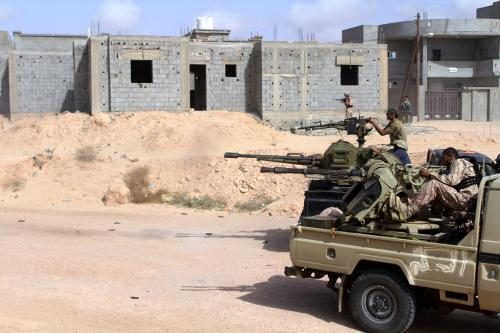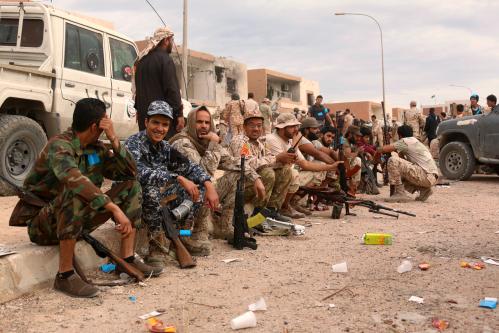Content from the Brookings Doha Center is now archived. In September 2021, after 14 years of impactful partnership, Brookings and the Brookings Doha Center announced that they were ending their affiliation. The Brookings Doha Center is now the Middle East Council on Global Affairs, a separate public policy institution based in Qatar.
The chaos in the Middle East today is thought to have a clear epicenter: Syria. But as diplomats and policymakers in the United States, Europe, and Russia continue to direct their energies there—including specifically on containing the threat posed by the Islamic State—Libya’s downward spiral has serious implications for the same actors. As such, Libya should be kept within strategic sightlines.
There is a risk that the Syria diversion makes the United States and the world more vulnerable to the dangers brewing in Libya—which in many ways are equally pressing as Syria’s. While the U.S. campaign season has highlighted discord over whether America should play a greater or lesser role in the world, these threats continue to grow—and they’ll affect U.S. policy options in the wider Middle East in any case.
The chaos within
Libya’s U.N.-backed Government of National Accord (GNA) has, until recently, been a timid beast. Sequestered in the Abu Sitta naval base in Tripoli, its governance orders and strictures largely fell on deaf ears as divisions within and across Libya’s regions fissured even deeper. Many observers—having built low expectations—were surprised that the GNA both sacked some of its absent ministers this July and relocated to official government headquarters in Triq al-Sikka in Tripoli in the searing heat. Neither move went unprotested locally, including particularly by the prime minister of the self-declared National Salvation Government (NSG), also in Tripoli, Khalifa al-Ghwell. Libya clearly has a long way to go in truly establishing unified power and governance across the country.
Forces affiliated with the GNA, NSG, and other militia elements are still competing fiercely and violently, seeking power by consolidating their grip on a country characterized by endemic regionalism. The Islamic State, meanwhile—which has faced setbacks in Syrian and Iraqi territory—is expanding in Libya in terms of fighters, as well as attempts to grab territory and economic resources. Even though ISIS has been displaced from its stronghold in Sirte, it has not been destroyed, and its ambition to endure in Libya remains as strong as ever. Misrata’s militias have recaptured some territory, but this does not alleviate concerns that escaping ISIS forces will merely relocate, regroup, and resume launching attacks across the country. That would, among other things, likely prolong and even deepen U.S. military and strategic involvement.
The warring factions are focused on economic resources also, considered vital to political legitimacy. This was all too evident in July when the state-owned National Oil Corporation (NOC) announced a merger with a competing oil company based in Libya’s east, where a third government in Benghazi is led by Prime Minister Abdullah al-Thinni. His government demanded that the NOC be based in Benghazi and that it receive as much as 40 percent of net oil revenues. Those demands highlighted the unfolding power contest between it and the GNA, and oil ports only reopened following an intervention by U.N. envoy Martin Kobler. But there are suspicions that the Petroleum Facilities Guard, which protects oil ports, effectively strong-armed payment (including salaries for their armed forces) to keep the ports open. The fear is that this will only encourage other militias to do the same, leaving this oil-dependent economy in an even more vulnerable state. Already, the Libyan dinar has plunged to new lows, cash is short, and renewed protests over the state of the economy and foreign intervention have compelled the GNA in Tripoli to declare a state of emergency.
Enter: The West
Now add foreign interventions to this context. U.S. airstrikes via Operation Odyssey Lightning—an air campaign launched in early August in support of Libyan ground forces, mostly in and around the coastal city of Sirte—are a short-term, exogenous shock. And the haunting consequences of NATO’s 2011 intervention remain pertinent, but they are now measured against what appears to be a growing stealth intrusion in the east involving French special forces and other Western militaries, in cooperation with the Libyan National Army. (They allegedly now have a joint command operations center in Benina.) France also supports the powerful General Khalifa Haftar, who continues to reject the GNA.
The Libyan public isn’t keen on such interference, to say the least. Protests have broken out: some dispute the GNA’s very claim to power, for example, and others specifically target France due to its links to Haftar. The French experience—intervening in the Libyan quagmire and hoping it has backed the right players—highlights the dangers to the United States.
U.S. strikes speak to the seriousness of the Libyan situation, and the truth is that recent developments in the country have important consequences for the West. Europe, in particular, is already contending with a terror threat and an ongoing surge of migrants and refugees from Libyan waters—and a worsening humanitarian crisis in Libya could destabilize its North African neighbors. No matter how much the leaders of the 2011 intervention in Libya console themselves that they acted correctly, the United States and its allies must account for the consequences of that decision.
For the foreseeable future, Libya will only implode further, animating strategic debates in many Western capitals. At present, much of this debate focuses on whether to engage or disengage (from the Middle East or even more broadly), but this is the wrong debate. Under the Obama administration, disengagement was the goal (and in many cases became a reality), but the United States found itself intervening anyway, with significant security consequences at home and abroad for its citizens. Re-thinking intervention is surely the challenge ahead.
The Brookings Institution is committed to quality, independence, and impact.
We are supported by a diverse array of funders. In line with our values and policies, each Brookings publication represents the sole views of its author(s).








Commentary
Libya’s implosion and what it means for the West
September 8, 2016